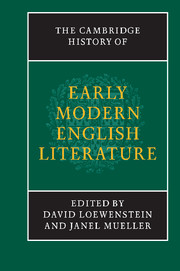Book contents
- Frontmatter
- Introduction
- 1 Modes and means of literary production, circulation and reception
- 2 The Tudor era from the Reformation to Elizabeth I
- 3 The era of Elizabeth and James VI
- 4 The earlier Stuart era
- 5 The Civil War and Commonwealth era
- 21 Literature and national identity
- 22 Literature and religion
- 23 Literature and London
- 24 Literature and the household
- 25 Alternative sites for literature
- 26 From Revolution to Restoration in English literary culture
- Chronological outline of historical events and texts in Britain, 1528–1674, with list of selected manuscripts
- Select bibliography (primary and secondary sources)
- Index
- References
25 - Alternative sites for literature
from 5 - The Civil War and Commonwealth era
Published online by Cambridge University Press: 28 March 2008
- Frontmatter
- Introduction
- 1 Modes and means of literary production, circulation and reception
- 2 The Tudor era from the Reformation to Elizabeth I
- 3 The era of Elizabeth and James VI
- 4 The earlier Stuart era
- 5 The Civil War and Commonwealth era
- 21 Literature and national identity
- 22 Literature and religion
- 23 Literature and London
- 24 Literature and the household
- 25 Alternative sites for literature
- 26 From Revolution to Restoration in English literary culture
- Chronological outline of historical events and texts in Britain, 1528–1674, with list of selected manuscripts
- Select bibliography (primary and secondary sources)
- Index
- References
Summary
This chapter examines a spectrum of civil war and Interregnum venues – literal and textual – in which authors either imagined alternatives to engagement or pursued intellectual projects at some remove from the era’s political, religious and military conflicts. Drawing on longstanding generic practices, foreign and native, as well as various philosophical and religious traditions, numerous writers, mainly Royalist, celebrated country life and rural retirement in order to evade or address Britain’s crisis. Royalist authors also expressed defiant insouciance, shared values and mutual support-in-adversity with innovative contributions to traditional genres, such as the drinking poem, and newer sorts of publications, such as the anthology of verse ‘drollery’. With differing degrees of involvement in current events, like-minded intellectuals, such as Samuel Hartlib’s circle, the Oxford scientific club and the Cambridge Platonists articulated new intellectual visions. Others, such as Thomas Browne and Thomas Urquhart, pursued more solitary intellectual and literary paths for a personal purchase on both their age and eternity, or participated in contemporaries’ group endeavours with self-conscious distinctiveness – as did John Milton, the Puritan convivial poet and Hartlib’s classicising colleague in educational reform.
One of the greatest celebrants of country life and retired contentment, Robert Herrick mixes lyric grace and epigrammatic point in his 1648 volume consisting of the predominantly secular Hesperides and religious Noble Numbers. Hesperides documents ‘Times trans-shifting’ (‘The Argument of his Book’, line 9) – not only seasonal changes, ageing and death, but also English sociopolitical disruption. Yet the polysemous title Hesperides evokes England as a paradisal garden island.
- Type
- Chapter
- Information
- The Cambridge History of Early Modern English Literature , pp. 763 - 789Publisher: Cambridge University PressPrint publication year: 2003

